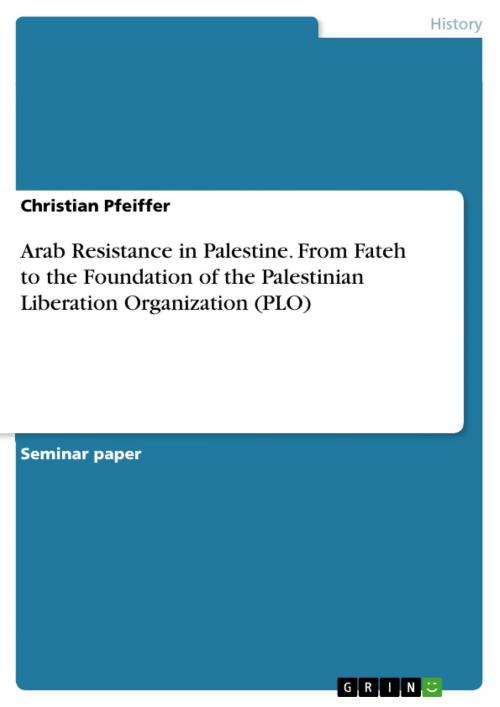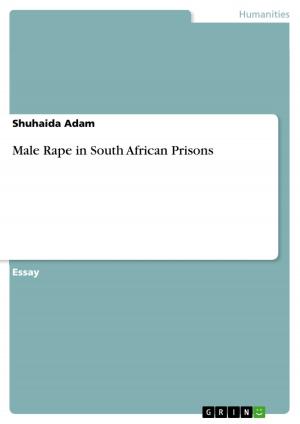Arab Resistance in Palestine. From Fateh to the Foundation of the Palestinian Liberation Organization (PLO)
Nonfiction, History, Asian, Asia| Author: | Christian Pfeiffer | ISBN: | 9783638409537 |
| Publisher: | GRIN Publishing | Publication: | August 16, 2005 |
| Imprint: | GRIN Publishing | Language: | English |
| Author: | Christian Pfeiffer |
| ISBN: | 9783638409537 |
| Publisher: | GRIN Publishing |
| Publication: | August 16, 2005 |
| Imprint: | GRIN Publishing |
| Language: | English |
Seminar paper from the year 2005 in the subject History - Asia, grade: A (= 1,0), Vesalius College Brussels, course: History of the Middle East, 15 entries in the bibliography, language: English, abstract: The Middle East of the present-days would look different without the Palestinian Liberation Organization (PLO), the political and military arm of the Palestinians. Over decades the organization transformed itself from the home of groups consisting of terrorists and armed fighters to the political voice of all Palestinians. Responsible for the efforts was the man who took over the PLO in 1969 and made it first the home for Arab terrorists and later to an organization to administer Palestine and to deal with the international parties concerned with the conflict in the Middle East: Peace-Nobel-Laureate Yasir Arafat. Decisive for the aggressive policies the PLO adopted in its first decade were the events surrounding its foundation and the takeover through Arafat and his Fateh organization. This research paper is going to examine why and how the powerful PLO could emerge. It is looking at the roots of Palestinian nationalism after World War II and introducing Arafat's Fateh movement. Afterwards it will take a close look to the foundation process of the PLO and its aims. The organization will be transformed in 1968 through Arafat. Hence the last chapter of this paper will deal with this issue. This research paper is based on a comprehensive bibliography containing primary and secondary sources and a scientific article on the topic. As basic work the very detailed book of Helena Cobban, The Palestinian Liberation Organisation - People, Power, Politics, was used.
Seminar paper from the year 2005 in the subject History - Asia, grade: A (= 1,0), Vesalius College Brussels, course: History of the Middle East, 15 entries in the bibliography, language: English, abstract: The Middle East of the present-days would look different without the Palestinian Liberation Organization (PLO), the political and military arm of the Palestinians. Over decades the organization transformed itself from the home of groups consisting of terrorists and armed fighters to the political voice of all Palestinians. Responsible for the efforts was the man who took over the PLO in 1969 and made it first the home for Arab terrorists and later to an organization to administer Palestine and to deal with the international parties concerned with the conflict in the Middle East: Peace-Nobel-Laureate Yasir Arafat. Decisive for the aggressive policies the PLO adopted in its first decade were the events surrounding its foundation and the takeover through Arafat and his Fateh organization. This research paper is going to examine why and how the powerful PLO could emerge. It is looking at the roots of Palestinian nationalism after World War II and introducing Arafat's Fateh movement. Afterwards it will take a close look to the foundation process of the PLO and its aims. The organization will be transformed in 1968 through Arafat. Hence the last chapter of this paper will deal with this issue. This research paper is based on a comprehensive bibliography containing primary and secondary sources and a scientific article on the topic. As basic work the very detailed book of Helena Cobban, The Palestinian Liberation Organisation - People, Power, Politics, was used.















